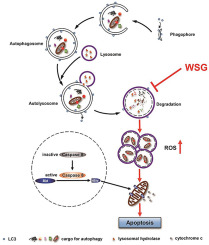Redox Biology ( IF 10.7 ) Pub Date : 2020-03-07 , DOI: 10.1016/j.redox.2020.101495 Ningning Wang 1 , Hongzhi Liu 2 , Guijun Liu 1 , Min Li 1 , Xuxiao He 1 , Chunzhao Yin 3 , Qiaochu Tu 3 , Xia Shen 3 , Wenqiang Bai 2 , Qiang Wang 2 , Yongzhen Tao 1 , Huiyong Yin 4

|
Autophagy is an evolutionarily conserved catabolic process that recycles proteins and organelles in a lysosome-dependent manner and is induced as an alternative source of energy and metabolites in response to diverse stresses. Inhibition of autophagy has emerged as an appealing therapeutic strategy in cancer. However, it remains to be explored whether autophagy inhibition is a viable approach for the treatment of hepatocellular carcinoma (HCC). Here, we identify that water-soluble yeast β-D-glucan (WSG) is a novel autophagy inhibitor and exerts significant antitumour efficacy on the inhibition of HCC cells proliferation and metabolism as well as the tumour growth in vivo. We further reveal that WSG inhibits autophagic degradation by increasing lysosomal pH and inhibiting lysosome cathepsins (cathepsin B and cathepsin D) activities, which results in the accumulation of damaged mitochondria and reactive oxygen species (ROS) production. Furthermore, WSG sensitizes HCC cells to apoptosis via the activation of caspase 8 and the transfer of truncated BID (tBID) into mitochondria under nutrient deprivation condition. Of note, administration of WSG as a single agent achieves a significant antitumour effect in xenograft mouse model and DEN/CCl4 (diethylnitrosamine/carbon tetrachloride)-induced primary HCC model without apparent toxicity. Our studies reveal, for the first time, that WSG is a novel autophagy inhibitor with significant antitumour efficacy as a single agent, which has great potential in clinical application for liver cancer therapy.
中文翻译:

酵母β-D-葡聚糖通过损害自噬和溶酶体功能,在肝癌中发挥抗肿瘤活性,促进活性氧的产生和凋亡。
自噬是一种进化上保守的分解代谢过程,它以溶酶体依赖的方式回收蛋白质和细胞器,并被诱导为对各种压力作出反应的能量和代谢物的替代来源。抑制自噬已成为一种有吸引力的癌症治疗策略。然而,自噬抑制是否是治疗肝细胞癌(HCC)的可行方法仍有待探索。在这里,我们确定水溶性酵母β-D-葡聚糖(WSG)是一种新型的自噬抑制剂,并且在抑制HCC细胞增殖和代谢以及体内肿瘤生长方面具有显着的抗肿瘤功效。我们进一步揭示WSG通过增加溶酶体pH值和抑制溶酶体组织蛋白酶(组织蛋白酶B和组织蛋白酶D)的活性来抑制自噬降解,导致受损线粒体积累和活性氧(ROS)产生。此外,WSG通过激活caspase 8和在营养剥夺条件下将截短的BID(tBID)转移到线粒体中来使HCC细胞对细胞凋亡敏感。值得注意的是,在异种移植小鼠模型和DEN / CCl中,将WSG作为单一药物给药可达到显着的抗肿瘤作用4(二乙基亚硝胺/四氯化碳)诱导的主要HCC模型,无明显毒性。我们的研究首次揭示了WSG是一种新型的自噬抑制剂,作为单一药物具有显着的抗肿瘤功效,在肝癌治疗的临床应用中具有巨大的潜力。











































 京公网安备 11010802027423号
京公网安备 11010802027423号